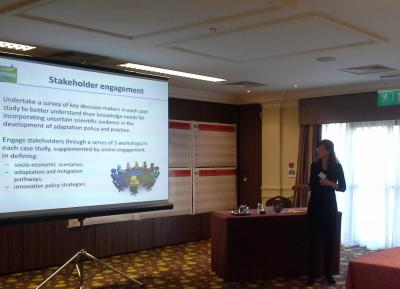The large-scale European Union FP7 funded project IMPRESSIONS (Impacts and Risks from High-End Scenarios: Strategies for Innovative Solutions) is holding its official Kick-off Meeting from 13 to 15 January 2014 in Oxford, United Kingdom.
 An international team of 27 research institutions from 18 countries will join forces to answer one of the hottest questions of our time, namely what will be the future of humankind and nature if climate continues to change at an unforeseen scale. The aim of IMPRESSIONS is to advance understanding of the consequences of high-end climate change and to evaluate how such knowledge can be embedded within effective and integrated adaptation and mitigation decision-making. In so doing, IMPRESSIONS will provide scientifically robust and policy-relevant information on the more extreme and long-term consequences of climate change to inform adaptation planning.
An international team of 27 research institutions from 18 countries will join forces to answer one of the hottest questions of our time, namely what will be the future of humankind and nature if climate continues to change at an unforeseen scale. The aim of IMPRESSIONS is to advance understanding of the consequences of high-end climate change and to evaluate how such knowledge can be embedded within effective and integrated adaptation and mitigation decision-making. In so doing, IMPRESSIONS will provide scientifically robust and policy-relevant information on the more extreme and long-term consequences of climate change to inform adaptation planning.
"Although, the United Nations Framework Convention on Climate Change recognised that increases in global temperature should be below 2 degrees Celsius to avoid severe impacts, current emission trends suggest that limiting warming to the 2 degrees Celsius target will be difficult to meet. Indeed, without significant reductions in emissions, projections point to much more substantial warming. Despite the increasing plausibility of these high-end scenarios, there are few studies that assess their potential impacts, the ability of adaptation options to reduce vulnerabilities, and the potential synergies and trade-offs between adaptation and mitigation." explains the project coordinator Dr Paula Harrison, University of Oxford.
Lately we are witnessing many extreme weather events which affect every sphere of human life. Last week the USA have been experiencing severely cold weather where temperatures have dropped to -50 degrees Celsius in some States. At the same time, many areas of the UK have been hit by very strong winds and high waves that have caused widespread flooding and the evacuation of thousands of people. Extreme weather events may increase in frequency under high-end climate change. Thus, there is an urgent need for decision-makers to have access to more reliable scientific knowledge on such highly uncertain, but socio-economically important, futures. The new knowledge developed by the project will not only focus on the EU, but will consider interdependencies – or shared vulnerabilities – with countries beyond the EU's borders, for example through food and resource supply chains or effects on large-scale migration.

To achieve its goals IMPRESSIONS will:
- develop a novel stakeholder-driven methodology to create an integrated set of high-end climate and socio-economic scenarios;
- apply these scenarios to a wide range of existing and new models of impacts and adaptation in five case studies covering global, European and regional/local (Scotland, Iberia and Hungary) scales;
- embed the impacts modelling work within an innovative, integrated assessment approach which advances analysis of multi-scale and cross-sectoral synergies and trade-offs for adaptation planning;
- work with public and private decision-makers in each case study to develop adaptation and mitigation pathways;
- communicate the results to a broad community of stakeholders to enhance current approaches to climate change policies and actions.
- The project will work together with two sister initiatives, HELIX and RISES-AM, to share the latest state-of-the-art research on the consequences of high-end climate change.
"Members of the HELIX project look forward to working closely with IMPRESSIONS and RISES-AM towards our common aims of assessing potential impacts of high-end climate change. Between us we will look across the whole globe as well as in detail in specific regions, and by coordinating our work and comparing and contrasting our methods and conclusions, we will be able to maximise our resources and assess the reliability of our conclusions." comments Prof Richard Betts, HELIX project coordinator.